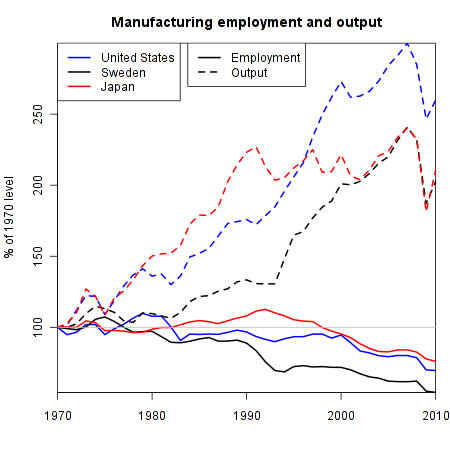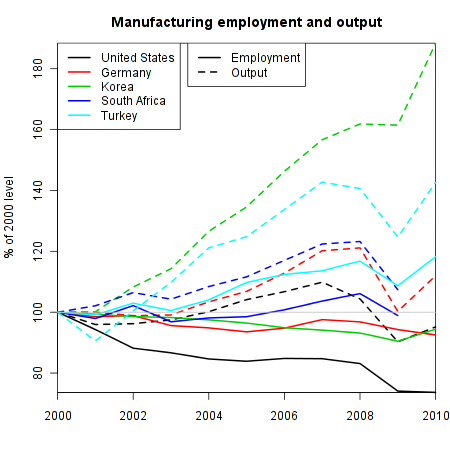Against Jobs, For Full Employment
July 26th, 2011 | Published in Political Economy, Politics, Time, Work
Mike Konczal [said something](https://twitter.com/#!/rortybomb/status/95569439671590913) on Twitter that pointed out the odd resonance between [this Will Wilkinson post](http://www.economist.com/blogs/democracyinamerica/2011/07/unemployment-and-jobs) at the *Economist* and the rant against obsessing over "job creation" that I wote for [*The Activist*](http://theactivist.org/blog/stop-digging-the-case-against-jobs). Actually, I originally wrote it for the newsletter of the political organization that I'm a member of, the [Democratic Socialists of America](http://dsausa.org/dsa.html), and my argument was directed at my fellow leftists who I think sometimes lose sight of our historic criticisms of wage labor as a source of alienation and domination.
Wilkinson, by contrast, is kind of a softcore libertarian. And yet here he is echoing a longstanding commonplace of Marxism:
> David Ellerman, one of my favourite challenging thinkers, argues that the employer-employee relationship is more like the master-slave relationship than we are inclined to believe. I know this sounds a little crazy, and I don't entirely buy his argument. But take a look; he's on to something. Philosophical questions of self-ownership and the alienability of labour aside, I am convinced that autonomy is profoundly important to most of us, and that the sort of self-rental involved in the employment relation is regularly experienced as a lamentable loss of autonomy, if not humiliating subjection. I think a lot of us would rather not work for somebody else.
This is not really very different from Marx's account of alienated labor in capitalism. (It is, incidentally, especially hilarious to see this is published by the *Economist*. It has existed since Marx's day, and you can actually find passages in Marx's work where he trashes the *Economist* for basically the same reasons people trash it today.) I was making basically the same point in my essay:
> Most of the unemployed don't actually want jobs -- that is, they don't just want a place to show up every day and be told what to do. The real problem these people have is not that they need jobs, but that they need money. We've just been trained to think that the only way to solve this problem is to get people jobs.
In other words, wage labor sucks, and a lot of people will only do it if the alternative is destitution.
Of course, Wilkinson's argument differs from mine in important ways. In particular, he conceives of the alternative to wage labor in terms of other kinds of monetized interactions, like "cutting hair for money in a kitchen, or legally making a few bucks every now and then taxiing people around town in a 1988 Ford Escort", whereas I focused more on socially beneficial activities that are outside the money economy altogether, like taking care of children and writing open source software, and on the inherent benefits of simply increasing everyone's free time. Hence his policy recommendations, while overlapping with mine somewhat, are focused on deregulation and opening up the informal economy.
I'm not necessarily against deregulating the labor market. But deregulation would have to be paired with a far more robust social democratic safety net in order to ensure that a life outside the control of the boss is possible for everybody, and not just for a small labor aristocracy of people like Will Wilkinson (and me). That's why my essay talked about national health care, more generous unemployment, efforts to reduce the work week, and ultimately some kind of guaranteed income that allows people to survive outside of the labor market. (As for where the money for this should come from, please see [John Quiggin](http://crookedtimber.org/2011/07/25/where-the-money-is/).) Those are the things that make exiting the labor market a real option for the non-rich. And just as importantly, they reduce the risk and uncertainty that's associated with not having regular, full time employment. As it stands, the downside risk of losing your job is much greater if you're less educated, less healthy, or have more dependents than Wilkinson does.
I view all of this as an alternative strategy for getting back to full employment that doesn't rely entirely on job-creation programs. I want to clarify this point, because it wasn't made well in my original essay, which was constructed to be as brief and inflammatory as I could make it in order to attract as much attention to the argument as possible. I've noticed that some people conflated my rant against *jobs* with an opposition to *full employment*.
So I should make clear that I'm not opposed to full employment; in fact, I think that achieving and maintaining full employment is of paramount importance if we want to give people the real option of cutting back hours or quitting their jobs. For example, we know that there are lots of people who [wish they could work fewer hours](http://muse.jhu.edu/login?uri=/journals/social_forces/v081/81.4reynolds.html), but whose employers won't let them. And studies like these probably understate the desire for fewer hours because they don't do a very good job of distinguishing the desire for work from the desire for money. But whatever people would *like* to do, they don't have much leverage to negotiate or to find new jobs if they face a millions-strong reserve army of the unemployed. In a high-unemployment environment like the current one, we see people who have jobs [being worked harder](http://motherjones.com/politics/2011/06/speed-up-american-workers-long-hours), but quitting at [historically low rates](http://money.cnn.com/2010/03/23/news/economy/trapped_in_a_job/index.htm).
However, the demand for full employment is distinct from the demand for jobs in ways that are politically salient. It is important to bear in mind that "full employment" is not just another way of saying "lots of jobs". It is a piece of economic jargon, a technical term for the situation in the labor market when employers' demand for labor meets or exceeds the supply of people looking for jobs across all the broad categories of employment. Keeping the economy in this state is highly desirable for working people and for leftist politics, for reasons best explained in the 1940's by the Polish economist Michal Kalecki, in his important essay on ["Political Aspects of Full Employment"](http://mrzine.monthlyreview.org/2010/kalecki220510.html):
> [U]nder a regime of permanent full employment, the 'sack' would cease to play its role as a 'disciplinary measure. The social position of the boss would be undermined, and the self-assurance and class-consciousness of the working class would grow. Strikes for wage increases and improvements in conditions of work would create political tension. It is true that profits would be higher under a regime of full employment than they are on the average under laissez-faire, and even the rise in wage rates resulting from the stronger bargaining power of the workers is less likely to reduce profits than to increase prices, and thus adversely affects only the rentier interests. But 'discipline in the factories' and 'political stability' are more appreciated than profits by business leaders.
Demands for government-led job creation target full employment by increasing demand for labor in the hopes that this will both soak up surplus labor directly and spur increased private sector demand for labor through the multiplier effect of public investment. However, there is no *a priori* reason why creating more demand for wage labor should be the only or the primary mechanism of reaching full employment. To the extent that job sharing schemes reduce unemployment by distributing work across more workers, the economy can approach full employment without creating new work in the aggregate. Just as importantly, since the definition of full employment depends on both the supply of and the demand for labor, full employment can be reached by reducing the supply of labor rather than increasing demand.
Why would we want to reduce labor supply? One reason, which I emphasized in "Stop Digging", is that wage labor is a form of domination that lots of people find inherently unpleasant, and that a lot of what people do for wages is less socially desirable than what they could do if they had control over their own time. But another good reason is that certain political priorities that the left supports for other reasons have the effect of decreasing labor supply. Hence a focus on the labor supply side can help us to ensure that the quest for full employment is not at cross purposes with our other goals.
Take, for example, health care reform. It is [generally accepted](http://voices.washingtonpost.com/ezra-klein/2011/01/theres_no_job-killing_health-c.html) that there are a certain number of people who would like to retire or otherwise leave the labor force, but who stay in their jobs because that is the only way they can maintain access to health insurance. A program of national health care that successfully guaranteed universal coverage and severed health care from employment would cause these people to drop out of the labor force; all things being equal, this would move the economy toward full employment as these jobs were filled by the unemployed and the total pool of people seeking work shrank. However, this move toward full employment involves no net job creation since it is entirely targeted to the labor supply side.
More generally, any reform that makes it easier to survive outside of employment may have the effect of reducing labor supply, if you believe--as I do and Will Wilkinson does--that lots of people would prefer not to work for wages if they can avoid it. Health care, government-funded child care, social security, welfare, and disability benefits are all steps toward what sociologists of the welfare state [refer to as the "de-commodification"](http://www.peterfrase.com/2011/06/de-commodification-in-everyday-life/) of labor power. To the extent that people can get by without working for wages, they are able to avoid commodifying themselves and selling their labor.
Even at the height of an economic expansion, large numbers of people are not participating in wage labor. Among Americans aged 16 and older, about a third are neither working nor looking for work--and this was true even before the recession. Some of these people are so-called "discouraged workers" who want a job but have given up looking for one, but many others are retired, or are in school, or unable to work due to disability, or are taking care of children and elders, or are voluntarily out of employment for some other reason. There are ways that public policy could be used to force many of these people into the labor force. But doing so is in general a *right-wing* policy goal: for the same reason that full employment is politically good for workers, it is bad for capitalists, and the political agents of capital understand that one way of avoiding full employment while maximizing profits is to keep the supply of labor as high as possible. Which is why Republicans are currently obsessed with [increasing labor supply](http://thinkprogress.org/yglesias/2011/07/26/279048/the-bigger-the-government-the-taller-the-people/) while doing nothing to increase the demand for labor.
"Against jobs, for full employment" seems at first like a paradoxical demand, but I hope I've shown that it isn't. By opposing the narrow rhetoric of job creation, I didn't intend to diminish the importance of tackling the crisis of the unemployed head-on; I merely wanted to suggest that there are alternative avenues for addressing this crisis that are both more humane and more radical.

